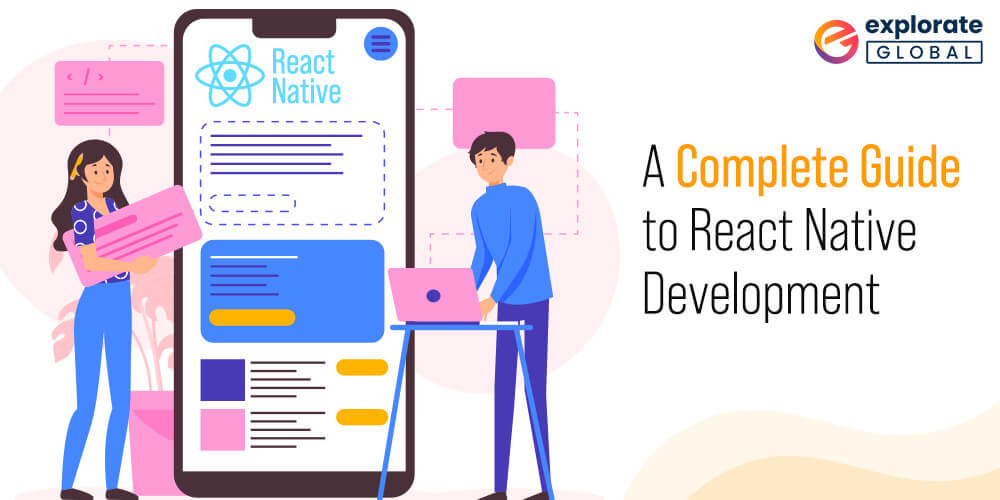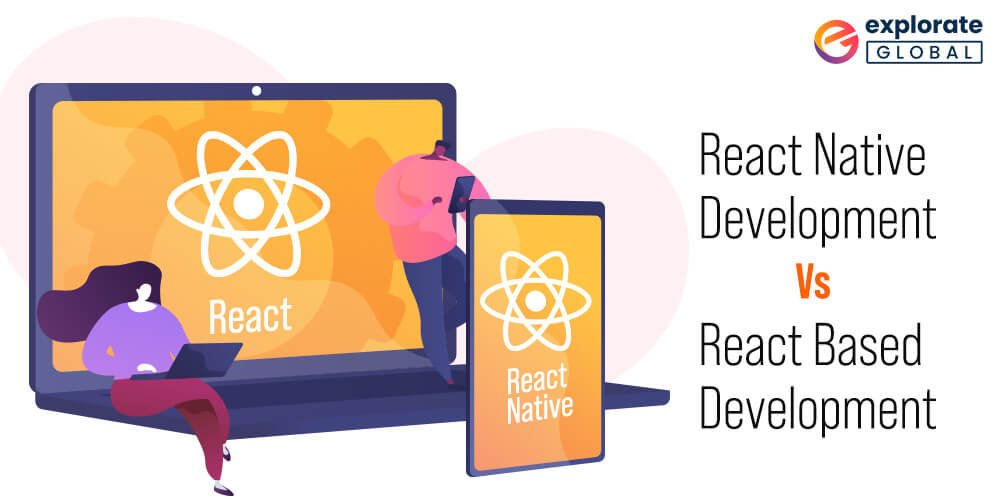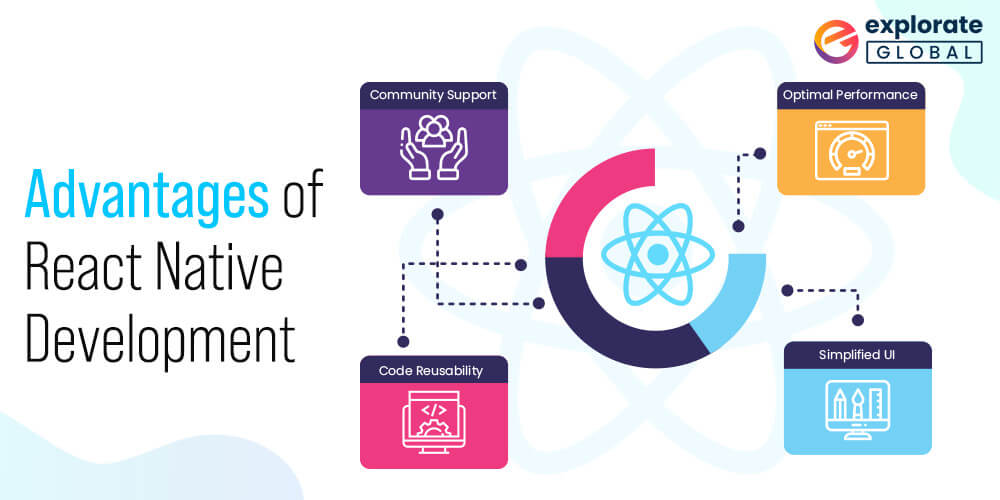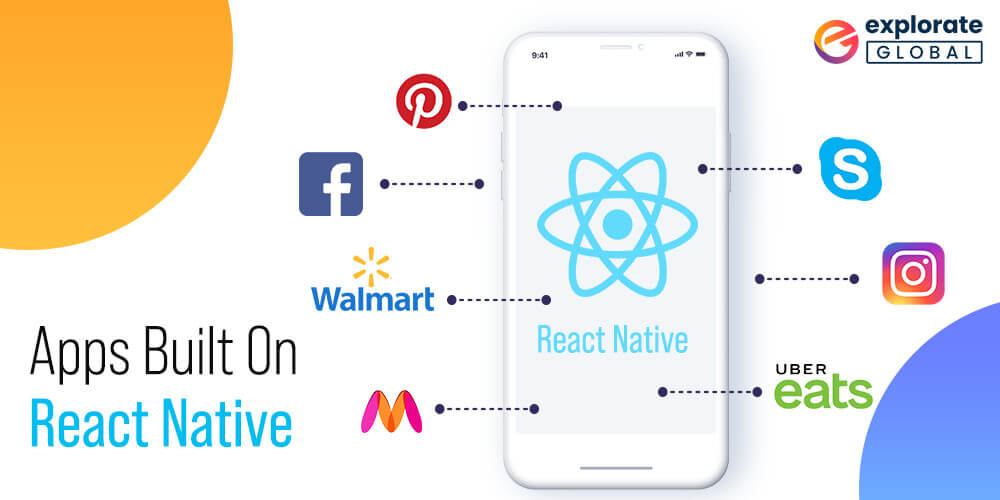
What is React Native?
React Native is an open source mobile application development framework developed by Facebook in 2015. React Native enables the web developers to create complex mobile applications using their existing JavaScript knowledge. React Native was launched on 26th March 2015. React Native can be used by React Native app developers for developing applications for platforms such as Android, Android Tv, iOS, MacOS, TvOS, web, Windows and UWP.
React Native is written in JavaScript, Java, C++, Objective-C and Python, to name a few and hence, the reason for its self-sufficiency and efficiency to work on most platforms of web app development.
React Native is currently the most popular mobile app development framework due to its ability to develop mobile apps for iOS and Android simultaneously as the same codebase can be used to develop applications for various platforms. Due to its ability to reuse the same code base for different platforms React Native became one of the most sought after solution for app development.
React Native Development Vs. React Based Development

React or React JS is a framework used for building applications using JavaScript. While React Native is an entire platform that allows the app developers to build native, cross platform mobile apps.
React.JS was introduced in 2011 by Facebook by Jordan Walke to address the need for a dynamic and high performing user interface (UI). While React Native was launched in 2015 by Facebook, as a response to a big technological mistake.
React.JS is a JavaScript library responsible for building a hierarchy of UI components, hence providing both front end and server side support. While React Native is a framework for building native applications using JavaScript.
Quintessentially, React.JS is the heart of React Native and it embodies all the principles and syntax of React, therefore making the learning curve easy.
It’s the difference of platforms that gives rise to astronomical differences between the two. The browser code in React is rendered via virtual DOM, but in React Native uses native API’s to render components on mobile.
While React.JS is just the V part of the MVC framework, a library meant for rendering views; React Native is compatible for developing mobile applications across multiple platforms while making use of the same data code.
To express the bottom line, React JS development is ideal for building dynamic, high performing and responsive UI for web interfaces while React Native Development is used to develop mobile applications to give a truly native feel.
How does React Native Development work?
React Native is written in a mixture of JavaScript and JXL, a special markup code resembling XML. The framework for React Native Development is such that it has the ability to communicate with both the realms, the realms being, JavaScript based threads and existing native app threads.
The communication between the two threads works with the help of “bridges.” Since, React Native threads and JavaScript based threads are both written in completely different languages, it’s due to the bridge that the two types of threads can establish a unique bidirectional and bilingual communication.
Being single threaded, React Native apps are easy to understand since everything that works with JavaScript on the web, will work the same way on the React Native. But if the app architecture involves many events and extensive amounts of data, then React Native app development might not be the best option since bridge structure is likely to cause delays.
Advantages Of Choosing React Native Development For Building Mobile Applications

1. Community Support
React Native has an open source framework, thus React Native developer’s community can easily examine and study its documentation, free of charge. The community of React Native developers and followers is humungous and hyper active. They are quick at giving feedback and answering questions, thus offering tremendous community support. The community members can contribute anything, in any way and any time they want to support and further amplify the community knowledge. React Native Framework has a huge community consisting of young and budding and inexperienced React Native developers to seasoned and experienced developers. Budding developers can always reach out for guidance from the other already established developers via this community.
2. Optimal Performance
It is righty said that the effectiveness of any platform is directly proportional to its performance. Higher effectiveness means high optimization and thus higher will be the performance of the platform. The effectiveness of this platform is high owing to the fact that the React Native framework promotes usage of its native modules, native controls, and native components.
Know More: Optimize Mobile App Performance
3. Code Reusability and Pre Developed Components
One of the biggest advantages of React Native development framework for React Native developer community is code reusability. The developers can reuse 90% of the React Native codes for both iOS and android apps, instead of creating different React Native codes for iOS and android separately. This in turn reduces development time and development cost of the project for businesses. You can outsource react native development to reduce the cost of your project.
4. Cross Platform Development Framework
React Native is one of the top cross platform development frameworks. Therefore, the app developers can build a code base just one time once and then run it on any platform with up to 90% reusability factor. A cross platform application developed in React Native is capable of running on any platform such as android, iOS, Windows, MacOS, Linux etc. This kind of functionality is a godsend for app and software developers since it’s not only a time-saver but also money saver as well. Not only that but it also helps in overcoming redundancy and duplication of unrequired efforts.
5. Live & Hot Re-loading
React Native supports both live and hot re-loading, even though the two concepts are at odds. Live reloading is a concept wherein compiling and reading of any changes made by the coder are made and there upon, a new and updated file is furnished to the simulator, which reads the app from the start automatically and runs the app by executing the changes.
Due to Hot re-loading wait time is reduced radically, as the React Native developers can instantly see the effects of the changes made by them in the code immediately even two or more react native Windows are opened for the code.
6. Cost-effective Solution
Due to the feature of code re-usability across various platforms for up to 90% of code, time taken to write the code, the efforts required to build the code and the human resource required to develop the code is reduced considerably. As the time, efforts and human resources required are reduced, hence the cost of developing a React Native app has been reduced as well. Thus making react native framework a cost effective solution for app development.
7. Simplified UI
Due to the highly responsive User interface and UX features offered by Applications built in React Native development framework, UI is really interactive and simple to use and thus takes less time to load.
8. Third Party Plug-in Support
React Native development framework offers the developers access to third party plugins like JavaScript modules and native modules for app development thus saving time and effort of developers.
9. Modular Architecture
React Native follows a modular programming approach which not only guarantees the segregation of programing functions into inter-changeable and free blocks called modules, but makes the code bases re-usable and the programming intuitive and interactive.
You Might Like: React Native App Development Mistakes
10. Increased Stability & Reliability
React Native has data binding feature which leads to data simplification. Data binding secures the parent data in such a way that it doesn’t get affected by any changes, modifications and updations made in the child component, thus, making the apps secure, robust and dependable.
11. Easy Accessibility to Libraries and Ready-made Solutions
React Native offers libraries and readymade solutions that can be used for free by anyone. These libraries and readymade solutions are pre-written and made available for usage by any developer as per discretion.
12. Pre developed components
React Native offers a wide range of Pre developed components in the open source library. The codes are pre-written and the developers can deploy as per requirement, thus leading to quick and effortless development.
These pre-developed components are freely available to the app developers for access. The already available code and its components are meant to be freely accessed and used.
Programming Languages Used In React Native Development
For the programming language, React Native development framework uses JavaScript and/ or JSX as React Native Languages. JSX or JavaScript XML is a programming language with a slightly different take on JavaScript and can be considered a mixture of JavaScript and HTML type syntax. JSX makes it easier to write and add HTML in React Native. Hence, JavaScript and JSX can be termed as React Native Languages.
React Native Mobile App Development Tools
A wide and endless variety of React Native app development tools are available that can be employed by the developers for accelerating the speed of app development process. Some of the important app development tools used in React Native Programming are listed below:
1. Atom
Atom is an open and free source text and source code editor that readily supports Windows, Linux and MacOS, developed by GitHub in 2014. It provides support for plug-ins written in JavaScript and embedded Git Control. It allows to pick several open source packages for additional features, services and functionalities such as in-built package manager, cross platform editing, multiple file navigation via a single window, bespoke designs and themes.
2. Visual Studio Code
Visual Studio Code is one of the most robust, free and open source code editors which was created by Microsoft. While it supports JavaScript, typescript and node.js, it also offers good ecosystem of extensions to support other languages such as c#, C++, java, PHP, and Python. The most highlighted features of Visual Studio Code are intelli-sense code completion and debugging. It supports platforms such as MacOS, Linux and Windows.
3. Nuclide
Another one of the most important React Native app development tools is Nuclide, which was developed by Facebook in 2015, as a free and open source React Native programming tool that is generally used as a single package. Nuclide offers hackability and large community support. Also, nuclide comes with in-built support for Flow. Its most noteworthy services include remote and JavaScript development, hack development, built in debugging, working sets, mercurial support, and task runner.
4. Flow
Another important open source based React Native application development tool is flow, which was developed by Facebook and released in 2014 that offers static typing. Flow offers speedy, reliable and simplified coding, along with easy integration, real time feedback, customizable JavaScript and type inference and monitoring of errors in the code via static typing annotations.
5. Expo
Expo was developed by expo as an open source tool chain for React Native developers. Its offers innumerable features such as documentation, slack community and community forums along with the offer of rich and extensive React Native development components like an Expo SDK library and native APIs for iOS and android platforms, both.
6. Ignite
Ignite CLI is a free, open source tool developed and launched in 2016 by Infinite Red. Ignite is a toolchain that consists of plugins and a boilerplate. Developers get access to several boiler plates and help & support from plugins. Boiler plates support cross platform app development for android and iOS both. Moreover, mentionable services provided by ignite include API testing, customizable themes, components and usage examples.
7. Reactotron
Reactotron is a free and open source desktop application developed by Infinite Red in 2016. Reactotron is able to support many platforms such as MacOS, Linux and Windows. Its functions include checking React JS and React Native apps; keeping track of status of application; monitoring of console.log messages; checking API requests and responses; dispatching actions and quick benchmarks.
React Navigation Tool is a very popular tool since it lets the developers establish routes and navigation in their native applications, with the help of navigators including Tab, Drawer, and Stack. React Navigation is written in JavaScript and helps in creating components for both iOS and Android platforms.
9. React Native Development Tools
An extension to Visual Studio Code extension, React Native development tools were developed by Microsoft to offer a helpful environment for developing React Native projects. It’s a free tool that runs the React Native command using the command palette and supports developers in the code debugging process as well.
10. Enzyme
Enzyme is a free JavaScript tool developed by AirBnB in 2015, used for testing apps, quite popularly. Enzyme makes it easier to manipulate, traverse and asset the React Native components.
Top Mobile Apps Built On React Native Framework

1. Facebook
React Native was launched by Facebook, Inc., in 2015 as a response to company’s technological need for bringing together all the advantages of web app development. Hence making Facebook one of the best React Native apps examples. The introduction of React Native development has enabled fast iterations and decreased start up time of the Facebook app. More so, a single team can build the whole product to mobile, as one code base can be used across one and all the viable multiple platforms and in this case, the Facebook app was developed using React Native development in mobile app development for both iOS and android platforms.
2. Walmart
Walmart’s iOS and android apps were written in React Native, a bold technological decision taken by the American grocer since the previous app fell below, “the standard that both we and our customers demand.” After shifting to React Native, the performance of android and iOS apps improved tremendously. The code base for iOS and android apps is shared up to 95% and only a single team is required for managing and developing both types of apps. Some of the other benefits of using React Native development as listed by the company itself are-
-
- A short time for marketing;
- Both platforms can be updated on the same day since 95% of the code data is common;
- App gives a native feel and possesses a smooth UX since the user interface of iOS and android apps is platform specific;
- It’s easy to onboard other teams as the React Native is written in JavaScript.
3. Skype
In 2017, Skype was totally rebuilt and redesigned using React Native, thus serving as yet another brilliant example of React Native apps. Everything was revamped for the new app by the React Native app developers, from the icons to the introduction of the new messaging interface which now has three conversation sections, find, chat and capture.
Owner of Skype, Microsoft, not only decided to use React Native Development for the mobile app version but also for the desktop version of Skype as well.
4. Instagram
Another React Native apps example includes Instagram. Instagram decided to integrate React Native into its existing native app. First of such integrations can be viewed via the introduction of Push notification view that originated as the web view. Using React Native, allowed the product teams to boost developer velocity by 85-99%.
5. UberEats
UberEats differs from the Uber app in the basic functionality department wherein there are three parties involved in UberEats rather than two as is in the case of Uber app.
The three parties are restaurants, delivery partners and diners, hence generating the need to build a very specific and special dashboard which would account for restaurants as well. The original dashboard lacked the functionality of communicating important information to restaurants. Also, the original app lacked access to native device functionalities, like sound notifications, thus contributing to negative feedback from the customers.
Thus the need for React Native development arose, as the development team had limited exposure to android and iOS but ample experience working with React.
6. Pinterest
Pinterest engineers were interested in discovering possibilities of using React Native app development ever since its introduction in 2015. They were initially offering web apps powered by Gestalt. While they had no intention of replacing gestalt entirely with React Native, they wanted to check if the integration could be carried smoothly into the current tech stack. Since, both React Native and Gestalt were based on React, the implementation process was less arduous. The Pinterest engineers created a prototype feature “the top picker”, using React Native framework. The engineers were impressed to see that not only were they able to save over a week’s time in the standard implementation process, but the high velocity and high performance of iOS and android apps was also detrimental. Since then, React Native framework has been used not just to power “the top picker” feature but also Pinterest’ business signup sequence.
7. Myntra
Owing to the React Native framework, Myntra is not only the perfect React Native apps example, but also a perfect example of how an online shopping portal on mobile should be like. Not only React Native based Myntra app has the perfect look and feel but also it provides one fine e- shopping experience to its customers. With amazing catalogues, profiles, order placement etc., Myntra offers amazing UI and UX to android and iOS users.
8. AirBnB
Another popular app built using React Native framework is AirBnB. A team of 60 members is working on React Native development technology on a daily basis in the development team to ensure smooth functioning of the app for both android and iOS users. Additionally, React Native helps time and money with the building of reusable code and easy refactoring process.
Frequently Asked Questions
What is the future of React Native?
The future looks bright for the React Native framework since the developers are continuously working towards a big change to make React Native more flexible in hybrid scenarios. Additionally, the ongoing Fabric project is capable of transforming the face of the framework. Moreover, its large number of React Native app developers and multi-platform support is going to drive more users in the future.
Why should I choose React Native over Hybrid apps?
React Native is a favorable and promising cross-platform tool for developing mobile applications, offering a high degree of code reusability across various platforms, a huge library of third-party integrations, and a robust and effective development environment. Unlike hybrid applications, React Native startup apps function natively, rather than running inside the web view. It means that the React Native apps are not restricted to the web-based UI elements which are known to be slow when associated with poor JavaScript interpreters.
How much does React Native app development cost?
If you want to estimate the budget to complete your React Native development project, remember that time and cost of development totally depend on your app’s functionality and complexity. The list of features, their individuality, and the complexity can increase the development cost. A simple mobile application with MVP is economical and can be finished within a shorter period, whereas a complex one that has modern and multiple features can take more time and cost you further.
Is React Native better than Swift?
Well, there is no direct answer to this question. It all depends on your project’s necessity and complexity. React Native utilizes internal APIs to run native elements. Thanks to JavaScript, the app adjusts to any screen size. React Native is a simple yet powerful working charger of app development. Both React Native and Swift are great and influential mobile app development solutions. However, your selection depends on the type of app that you’re working on.
Is React Native better than native apps?
If you are building an app for both Android and iOS platforms, you will have to build the same application twice from scratch for both platforms. On the other hand, if you are using the React Native app development services, you can reuse the same code several times. In addition, if you put in slightly more effort, the React Native application interface can be used for both Android and iOS, and that too at a low cost.
Why should I choose React Native over ReactJS?
React Native is a framework that allows web developers to build mobile applications that know about React and JavaScript. It enables faster mobile development and effective code sharing for all operating systems without negotiating on the quality of the product. React Native development is popular among developers because it allows for building native mobile apps for iOS and Android out of web applications written in JavaScript.
Conclusion
To conclude this post, we would like to inform you that we at Explorate Global, are an ISO and CMMI Level 3 certified organization, and have expertise in multiple new-age technologies. We have been rendering IT and Digital Marketing services since 2015 to small and medium as well as large enterprises all around the globe. We are unmatched at delivering business solutions to our clients such as App development, website development (PHP, .Net, Java, Salesforce, etc.), UI/UX designing, customized software development and content writing.
Additionally, we are not only a leading cross platform mobile app development company but also a leading react native app development company in the USA and India as well. We are very well versed with the ins and outs of react native mobile app development frameworks and have catered several projects requiring high proficiency and unparalleled skills for development of react native app based projects.
We have so far worked on, developed and delivered react native apps for a variety of industries and avenues such as, Healthcare, Real Estate, Finance and Insurance, Fitness and Sports, Automobile, Accounting, Finance, Communication, Education, etc.



2 thoughts on “A Complete Guide to React Native Development”